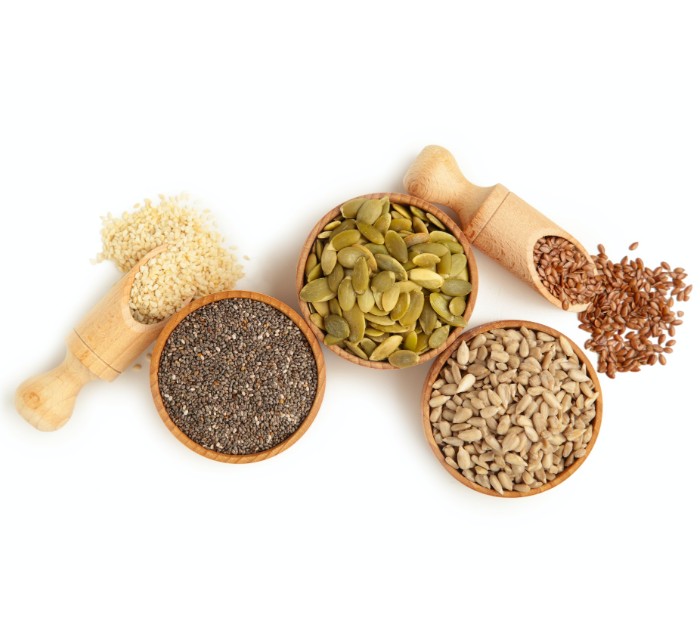Types of seeds to eat and their benefits
In this article, we take a look at different types of edible seeds and why they are good for you. You would be surprised when you read down here how much the addition of healthy seeds to your diet can benefit you.
Seeds are extremely versatile and can be incorporated easily into a variety of different recipes. Just a sprinkle of these types of seeds is enough to improve your health.
Before we start with the types of seeds to eat and their benefits, let’s see what are seeds and why it is good to add them into your diet!
This post may contain affiliate links, which means we may receive a small commission, at no cost to you, if you make a purchase through a link. For more information, please see our disclosure.
Why you should add seeds into your diet?
An edible seed is a seed that is suitable for human and animal consumption. We can define an edible seed as big nutrition in a tiny package.
Even small, they are packed with an abundance of nutrients and healthy fats. Plant seeds contain the same trio of carbohydrates, protein, and fat that nourishes the human body, along with fiber and an array of minerals and vitamins.
Why do we call this food small and mighty? Just remind yourself that one seed has the potential to become an entire plant – and since it contains the nutrients necessary to in order to make that happen, it is easy to see why the seeds of many plants can provide a lot of nutrients in a tiny package.
The best thing about this small but might food is that you can mix edible seeds into oatmeal or yogurt, blend them into a smoothie, sprinkle them over a salad.
Also, you can consume them toasted, raw, or roasted depending on the particular seed, and use them to amp up the dietary value of what you are eating.
Different types of edible seeds and their benefits
Flax Seeds
Flax seeds are one of the oldest crops and there are two types, brown and golden. They both are equally nutritious.
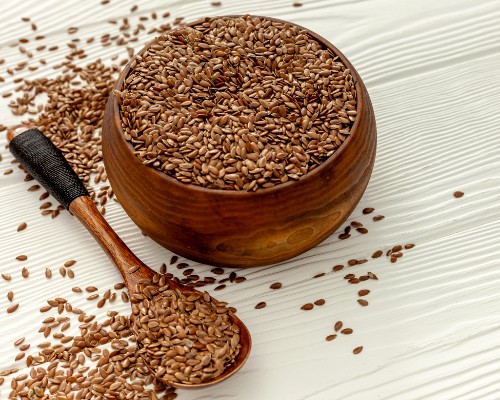
Ground or whole flaxseed? Ground flaxseed is better for most people, whole flax seeds are harder to digest.
A typical serving size for ground flax seeds is 1 tablespoon (7 grams). Just one tablespoon of flax seeds contains 37 calories, provides 3 grams of fiber (8-12% of the daily recommended intake for men and women), 1,597 mg of omega-3 fatty acids, and also a great number of vitamins and minerals.
Flax seeds are also a rich source of lignans. Lignans are plant compounds that have antioxidant and estrogen properties. Both of which can help lower the risk of cancer and improve health.
Further reading: Flaxseed: Benefits, Uses, and Possible Side Effects
Many studies show that those who eat flax seeds have a lower risk of breast and prostate cancer, as well as other types of cancer.
Interesting Fact
Flax seeds contain up to 800 times more lignans than beans, grains, fruits, vegetables, and other fiber-rich plant foods.
Today flax seeds are emerging as a “superfood” as more scientific research points to their health benefits. If your question is why these edible seeds are good for you? The answer is that flax seeds can help with:
- Digestion
- Weight Loss
- Boost heart health
- Reduce cholesterol
- Lower blood pressure
As a versatile food ingredient flax seeds are easy to add to your diet. So there is no better time than now to grab some flax seeds from your local store or you can buy them from Amazon here Organic Ground Flax Seeds.
Chia Seeds
These tiny black seeds native to Guatemala and Mexico were a staple food for the ancient Mayans and Aztecs. In fact “chia” is the ancient Mayans’ word for strength.
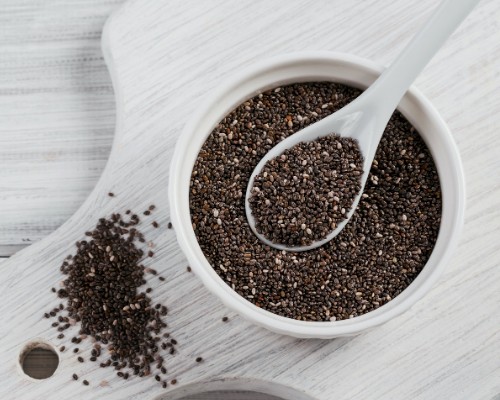
Today these edible seeds are recognized as a modern-day superfood and now are consumed by health-conscious people around the world.
Chia seeds are so tiny in size, but so powerful nutritious food that you can consume today. They contain a large amount of omega-3 fatty acids, large amounts of fiber, plenty of high-quality protein, essential minerals, and antioxidants.
About 75% of fats in chia seeds consist of omega-3 alpha-linolenic acid (ALA) and 20% consist of omega-6 fatty acids. These black, tiny seeds are the best-known source of omega-3s, even better than flax seeds.
Another important characteristic about chia seeds is these edible seeds contain 19% protein which is similar to other seeds but more than most cereals and grains.
Why this high protein percent is important? High protein intake is associated with increased fullness after meals and reduced food intake.
Packed with fiber, protein, and the best plant source of omega-3 fatty acids, chia seeds provide numerous health benefits.
The high protein and fiber content may help you lose weight.
The seeds soluble fiber absorbs large amounts of water and expands in your stomach which increases fullness and slows the absorption of food. On the other hand, the protein in these healthy edible seeds could help reduce appetite and food intake.
A study from 2017 shows that chia seed added to yogurt reduces short-term food intake and increases satiety. However, adding chia seeds to your diet is unlikely to cause weight loss on its own, but experts believe that it can be a useful addition to a weight loss diet.
When we are talking about losing weight and you have a problem shedding pounds even you are doing everything and trying hard here is an interesting read for you: You Can’t Lose Weight? Here Are The Reasons Why.
High in nutrients essential for bone health
The presence of calcium, phosphorus, magnesium, and protein is important for bone health. In chia seeds, the calcium content is really impressive-18% of the RDI in a single ounce (28 grams).
When we compare this gram to gram, it is higher than most dairy products. So these seeds are an excellent source of calcium for people who don’t eat dairy.
May reduce blood sugar levels
Animal studies from 2009 and 2012 found that chia seeds may improve insulin sensitivity and stabilizing blood sugar levels after meals. Also, human studies claim that eating bread with chia seeds lowers the post-meal rise in blood sugar compared to bread that doesn’t contain chia.
Find out more: Chia Seeds: Benefits, Side Effects and How To Eat Them
These edible seeds are so easy to add to your diet. They can be eaten raw, soaked in yogurt, juice, added in smoothies, baked goods, on top of cereals, vegetables, or rice dishes.
Good To Know
Chia seeds have the ability to absorb water and fat and they can be used to thicken sauces and as egg substitutes in recipes.
If you can’t find chia seeds in your grocery store you can buy them online from Amazon, here is our recommendation Organic Chia Seeds from BetterBody Foods.
Pomegranate Seeds
Pomegranates, a beautiful fruit that contains sweet, juicy nectar that surrounds a white seed in the middle. The seeds comprise around 3% of the weight of a pomegranate, and each seed is encased in a sweet covering called an aril.
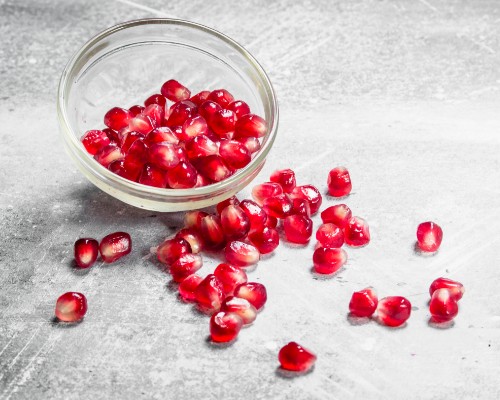
Pomegranate is a very healthy fruit but many people suck the juice of each seed before spitting the white fibrous middle out. If you are one of these people you are missing out on some of the health benefits of pomegranate.
Pomegranate seeds are edible and they are good for you! The seeds from pomegranate are high in vitamin E and magnesium. Also, they are rich in fiber, the main types of fiber in pomegranate seeds are cellulose and lignin.
These healthy edible seeds also comprise around 12-20% seed oil. This oil mainly consists of punicic acid. Some studies suggest that punicic acid may promote weight loss, improve insulin sensitivity and reduce inflammation, but more human studies are needed to confirm these claims.
If you want to find out more about pomegranate seeds and how to add them to your diet visit this post Why Pomegranate Seeds Are So Good For You.
What is the best way to eat pomegranate seeds? – You can sprinkle some seeds on your oatmeal or yogurt. Add them to smoothies or juices, toss the seeds into a fruit or green salad or just use the pomegranate seeds as a tiny garnish on avocado toast.
You won’t make a mistake if you decide to add the pomegranate edible seeds into your diet, they are delicious and healthy, try them now don’t wait!
Pumpkin Seeds
Most pumpkin seeds bought at supermarkets don’t have shells and they are green, oval, and flat.
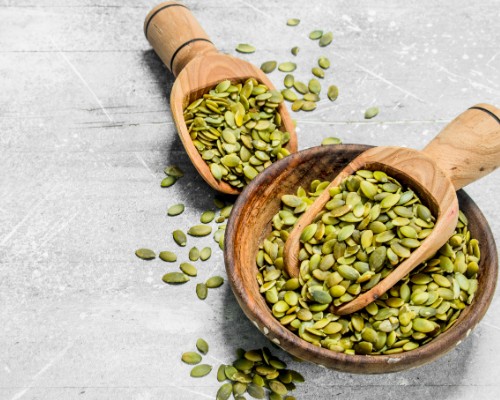
Just a small portion of pumpkin seeds (one ounce or roughly a quarter cup) provides 150 calories, 8-10 grams of healthy protein, 15 grams of fat, and a few grams of carbs. They are also rich in antioxidants, zinc, magnesium, iron, and many other nutrients.
Pumpkin seeds are known as the best natural source of magnesium, a mineral needed for more than 600 chemical reactions in your body. For example, healthy magnesium levels are important for your blood sugar levels, blood pressure, heart, and bone health.
More than 79% of adults in the U.S. have a magnesium intake below the recommended daily amount.
Fact To Remember
Like many seeds and nuts, pumpkin seeds also contain phytic acid, which can reduce the bioavailability of some nutrients you eat. If you eat seeds regularly you may want to soak them to reduce the phytic acid content, roasting them helps as well.
Have trouble falling asleep?
If the answer is yes, then you should eat some pumpkin seeds before bed. They are a natural source of tryptophan, an amino acid that helps promote sleep.
The only problem is that you need 1 gram of tryptophan daily to improve sleep, and to get that you will need to eat around 7 ounces (200 grams) of pumpkin seeds, which is maybe too much because the recommended daily intake of pumpkin seeds is 30 grams daily or quarter of a cup.
Good To Know
Pumpkin seeds are rich in fiber, so eating large amounts may cause gases or bloat. Also eating large amounts of pumpkin seeds at once may cause constipation. The AHA recommends a quarter cup of daily intake of pumpkin seeds which is approximately 30 grams.
Find out more about the benefits of pumpkin seeds and how to roast them properly at home.
These edible seeds are a healthy and popular snack in many countries. They can be eaten roasted or raw, salted or unsalted. You can add them to yogurt, smoothies, sprinkling them into salads or soups.
Hemp Seeds
Hemp seeds are the seeds of the hemp plant Cannabis sativa. Hemp is cultivated for making different products like health products, foods, fabric, natural remedies, and more.
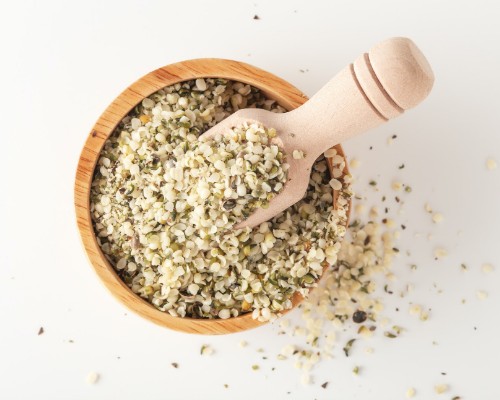
The seeds of hemp are edible and many people consider the hemp seeds as a “superfood” because the seeds have a rich nutritional profile and provide a range of health benefits.
These edible seeds have a mild, nutty flavor and are often referred to as hemp hearts. They contain over 30% fat and are exceptionally rich in two essential fatty acids, linoleic acid (omega-6) and alpha-linoleic acid (omega-3).
They also contain gamma-linolenic acid (GLA), which has been linked in studies to many health benefits, offers a healthy balance of omega-3 and omega-6 fatty acids.
Good To Know
Hemp seeds contain the perfect 3 to 1 ratio of omega-6 to omega-3 fatty acids, which is considered the optimal ratio for heart and brain health.
Hemp seeds are a great source of protein and more than 25% of their total calories are from high-quality protein. Just 2-3 tablespoons of hemp seeds provide 11 grams of protein, and these seeds are a complete protein source which means they provide all the essential amino acids.
Whole hemp seeds contain 20% soluble and 80% insoluble fiber. The soluble fiber forms a gel-like substance in your gut and it is a great source of nutrients for beneficial digestive bacteria and may also regulate cholesterol levels and reduce spikes in blood sugar.
Insoluble fiber helps food and waste pass through the gut, and it is also linked to a reduced risk of diabetes.
The shelled hemp seeds, or better known as hemp hearts contain very little fiber because the fiber-rich shell has been removed.
How to add hemp seeds to your diet
Hemp seeds can be eaten raw, roasted, or cooked with other foods. Try incorporating hemp seeds into your diet by:
- adding the seeds to smoothies
- sprinkling on cereal, yogurt, or salad
- baking with hemp seeds
- making hemp milk at home using whole seeds
You can find hemp seeds in health food stores or you can buy them online. You can order here this Organic Hemp Hearts Shelled Hemp Seeds and if you haven’t tried hemp milk we recommend this Natural Unsweetened Vanilla Hemp Milk.
Sesame seeds
Sesame seeds are tiny, flat, oval seeds with a nutty taste and a delicate almost invisible crunch. Depending on the variety they come in a host of different colors like white, yellow, black, and red.
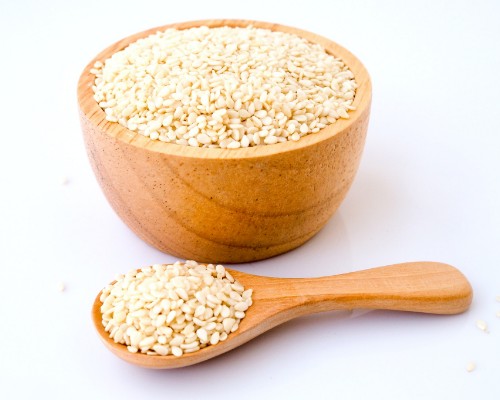
White sesame seeds have higher iron content than black ones and are mostly used as ingredients in food or in the form of oil.
Black sesame seeds are flavorful and have a stronger aroma than white and brown and are preferably used in medicines. They contain 60% more calcium than the white ones.
White sesame seeds are hulled, whereas black and brown ones retain their hulls.
Are sesame seeds good for you? The answer is an absolute yes. The benefits of sesame seeds are not just culinary, this nutrient-dense condiment is good for our body as well.
Great source of fiber
Just three tablespoons of sesame seeds provide 3.5 grams of fiber, which is 12% of the RDI. The average fiber intake in the U.S. is only half of the RDI and eating sesame seeds regularly can help increase your fiber intake.
Good source of B vitamins
Sesame seeds are a good source of certain B vitamins (B1, B3, B6) which are distributed both in the hull and seed. Removing the hull may either concentrate or remove some of the B vitamins.
Nutritious source of plant protein
Three tablespoons of sesame seeds (30 grams) provide 5 grams of protein. To maximize protein availability choose hulled or roasted sesame seeds. The hulling and roasting process reduces oxalates and phytates – compounds that humper your digestion and absorption of protein.
To learn more about these edible seeds visit this article Sesame Seeds: Why They Are Good For You and How To Eat Them.
How to enjoy: A few quick serving ideas
- Sesame seeds add a great touch to steamed broccoli that has been sprinkled with lemon juice.
- Combine toasted sesame seeds with rice vinegar, soy sauce, and crushed garlic and use as a dressing for salads, vegetables, and noodles.
- Add sesame seeds into the butter the next time you make homemade bread, muffins, or cookies.
- You can use sesame seed batter also known as tahini in place of peanut butter or hummus.
To enhance the flavor and nutrient availability of sesame seeds roast them at 3500F (1800C) for a few minutes, stirring periodically, until they reach the light, golden brown.
Sunflower Seeds
Sunflower seeds are fruits from the sunflower plant Helianthus annuus. There are two main types of sunflower crops, one type is grown for the seeds you eat and the other which is majority farmed is grown for the oil.
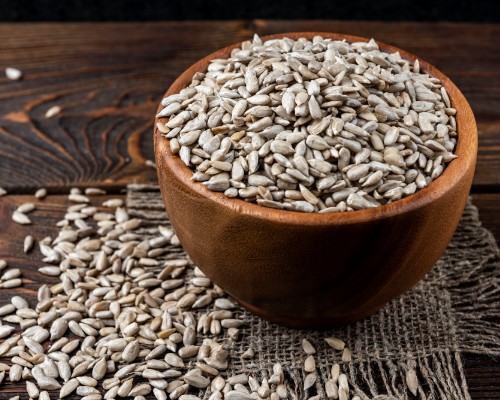
The edible sunflower seeds are encased in inedible black-and-white striped shells, called hulls. The seeds used for extracting sunflower oil have solid black shells.
The edible variety has a mild, nutty flavor and they are often roasted to enhance the flavor, though you can also buy them raw.
Why these edible seeds are good for you? – The sunflower seeds are especially high in vitamin E, selenium, phenolic acids, and flavonoids. These compounds function as antioxidants to protect your body’s cells against free radicals.
When sunflower seeds are sprouted, their plant compounds increase and sprouting also reduces factors that can interfere with mineral absorption.
Due to the presence of magnesium, vitamin E, protein, linoleic fatty acid, and several plant compounds, sunflower seeds may help lower blood pressure, cholesterol, and blood sugar.
Tips for eating
Shelled sunflower seeds are commonly eaten by cracking them with your teeth, then spitting out the shell – which shouldn’t be eaten.
Here is how you can add them to your diet:
- Sprinkle on a leafy green salad, over fruit or yogurt
- Stir into tuna or chicken salad or add to veggie burgers
- Stir into homemade granola bars, hot or cold cereals
- Add to baked goods such as bread or muffins
Sunflower seeds may turn blue-green when baked, this is a result of a chemical reaction between the seeds’ chlorogenic acid and baking soda. To prevent this just reduce the amount of baking soda.
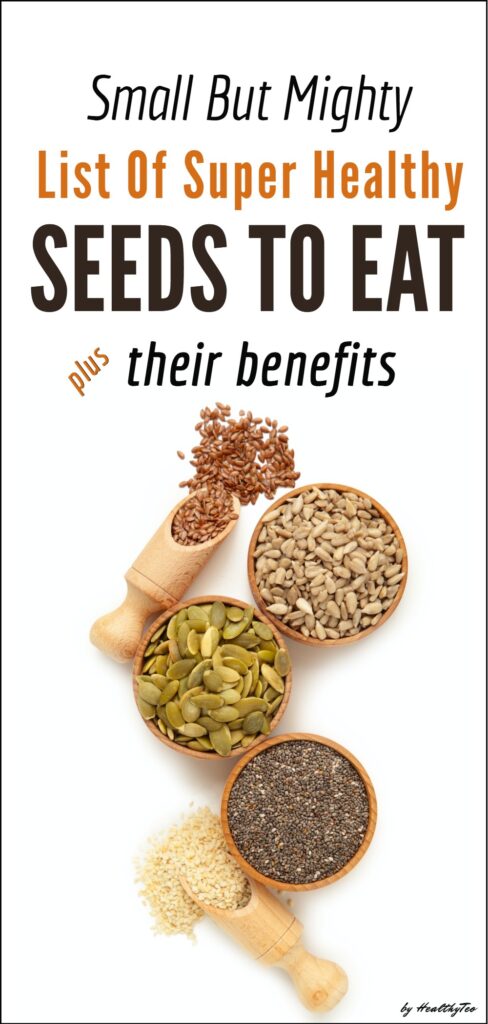
Final thoughts about edible seeds and their benefits
If you are wondering which of these seeds to choose, there is no correct answer. All of these edible seeds are good for you.
Just make a choice and start using them in your recipes. You will see which of these seeds is good for your taste and how it makes difference to your food. Sure if you use them as another ingredient of your healthy recipes.
There is another solution, almost all of these can be eaten raw, so why don’t you taste them raw or roasted before and find out if that seed is good for you.
No matter what you choose to add to your diet you won’t make a mistake. Our recommendation is to try to use all of them because all these seeds are beneficial for your health and every edible seed has different characteristics.
Small and mighty, edible seeds offer a good range of nutritional benefits. Try to use them more in your recipes and you won’t regret it!

